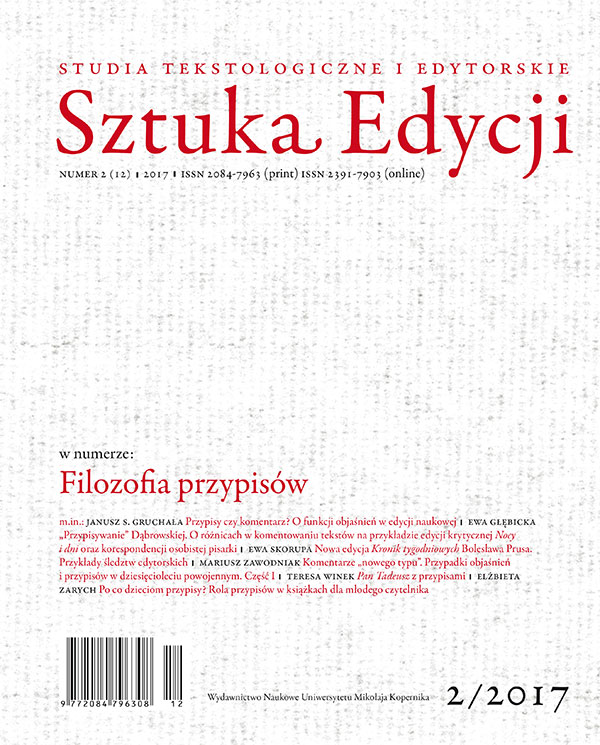Translator’s struggle with a footnote. Reduction of translator’s paratexts as a poetry-making process – the case of Stanisław Barańczak
DOI:
https://doi.org/10.12775/SE.2017.0024Keywords
translation, poetry, translator’s footnote, translator’s paratextAbstract
The paper attempts to make a reflexion on translation techniques, by means of which a translator-poet Stanisław Barańczak reduces the number of footnotes and translator’s comments in the process of translating English-written poetry into Polish. Barańczak’s code of translator, declared in the volume Ocalone w tłumaczeniu, contains the postulate of literary translation which are both “comprehensible” and “poetic”. In the case of poems which were strongly embedded in their original cultural context it means, on the one hand, the necessity to supplement a model reader’s knowledge with additional information, on the other hand, to limit the commentaries which are not directly included into the composition (which are “non-poetic” paratexts). The conflict between both necessities forces Barańczak to develop a non-standard translating practice: making use of intertextual explications, which are however marked (by means of graphemica and punctuation: with brackets, pauses and quotation marks) as explanatory additions which are absent in the original composition, yet introduced arbitrarily by the author. Consequently, the transformation of an intratextual comment into an element of the composition results in a modification of the lyrical message; this, in turn – bearing in mind the creative nature of poetry translation – makes such transformation an element of the artistic process.
References
Auden W. H., 1944, 44 wiersze, tłum. S. Barańczak, Kraków.
Aury D., 1963, Préface, w: G. Mounin, Les problèmes théoriques de la traduction, Paris.
Balcerzan E. (red.), 1984, Wielojęzyczność literatury i problemy przekładu artystycznego, Wrocław.
Barańczak S., 2004, Ocalone w tłumaczeniu, Kraków.
Barańczak S. (et al.), 1955, Boski Dante po polsku (dyskusja redakcyjna), „Literatura na Świecie”, nr 4.
Bishop E., 1995, 33 wiersze, tłum. S. Barańczak, Kraków.
Filipowicz-Rudek M. et al. (red.), 1997, Czy zawód tłumacza jest w pogardzie?, Kraków.
Genette G., 2014, Palimpsesty. Literatura drugiego stopnia, tłum. T. Stróżyński, A. Milecki, Gdańsk.
Heydel M., 1995, Elizabeth Bishop jako poetka polska, „Literatura na Świecie”, nr 5–6.
Hrehorowicz U., 1997, Przypisy tłumacza: to be or not to be?, w: Czy zawód tłumacza jest w pogardzie?, pod red. M. Filipowicz-Rudek et al., Kraków.
Hrehovčik T., 2006, Introduction to Translation, Rzeszów.
Jarniewicz J., 1995, Cierpki smak ostryg, „Literatura na Świecie”, nr 4.
Jarniewicz J., 2002, Problematyka rodzaju w przekładzie literackim, w: Warsztaty translatorskie, t. 2, pod red. R. Sokoloskiego et al., Lublin–Ottawa.
Keats J., 1997, 33 wiersze, tłum. S. Barańczak, Kraków.
Larkin P., 1991, 44 wiersze, tłum S. Barańczak, Kraków.
Lear E., Carroll L., Gilbert W. S. et al., 1998, 44 opowiastki, tłum. S. Barańczak, Kraków.
Markiewicz H., 2004, O cytatach i przypisach, Kraków.
Modzelewska N., 1975, Refleksje tłumacza, w: Przekład artystyczny, t. 2, pod red. S. Pollaka, Wrocław.
Mounin G., 1963, Les problèmes théoriques de la traduction, Paris.
Nabokov V., 2000, Problems of Translation. „Onegin” in English, w: The Translation Studies Reader, ed. L. Venuti, London–New York.
Pollak S. (red.), 1975, Przekład artystyczny, t. 2, Wrocław.
Shakespeare W., 2000, Burza, tłum. M. Słomczyński, Kraków.
Shakespeare W., 1958, Burza, tłum. W. Tarnawski, Wrocław.
Shakespeare W., 1976, Burza, tłum. J. S. Sito, Warszawa.
Shakespeare W., 1956, Burza, tłum. Z. Siwicka, Warszawa.
Shakespeare W., 1921, Burza, tłum. J. Paszkowski, Kraków.
Shakespeare W., 1991, Burza, tłum. S. Barańczak, Poznań.
Shakespeare W., 2012, Komedie, tłum. S. Barańczak, Kraków.
Skibińska E. (red.), 2009, Przypisy tłumacza, Wrocław–Kraków.
Sokoloski R. et al. (red.), 2002, Warsztaty translatorskie, t. 2, Lublin–Ottawa.
Święch J., 1984, Przekłady i autokomentarze, w: Wielojęzyczność literatury i problemy przekładu artystycznego, pod red. E. Balcerzana, Wrocław.
Vaughan H., 2000, 33 wiersze, tłum. S. Barańczak, Kraków.
Venuti L. (ed.), 2000, The Translation Studies Reader, London–New York.
Downloads
Published
How to Cite
Issue
Section
Stats
Number of views and downloads: 1154
Number of citations: 0



